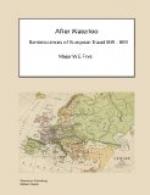They sometimes affect a fastidiousness of stomach which is quite laughable, and not at all peculiar to the Germans, who are in general blessed by nature with especial good appetites; and they spend so much money that the English officers who have not had the advantages of plunder that these Prussians have had must appear by the side of them stingy and niggardly.
I was witness one day to a whimsical scene, which will serve to give you an idea of the airs of importance these gentlemen give themselves. I was one day at Versailles and after having visited the palace and gardens I entered the Salon of a restaurateur and called for a veal cutlet and vin ordinaire. There was a fat Prussian Major with two or three of his companions at one of the tables, who had been making copious libations to Bacchus in Burgundy and Champaign. He heard me call for vin ordinaire, and whether it was to show his own magnificence I know not, but he called out to the cafetiere: “Madame, votre vin ordinaire est il buvable? car j’en veux donner a mon trompette, et s’il n’est pas bon, il n’en boira pas. Faites venir mon trompette.” Now I dare say in his own country this Major would not have disdained even the “schwarze Bier” of Brandenburgh.
Scarcely any quarrels, I believe, take place between the English and French, nor did I hear of any violent fracas but one. In this instance, the English officers concerned must have been sad, brutal, vulgar fellows. They, however, after behaving in a most gross insulting manner, were compelled by some Frenchmen not to eat but to drink their words, and that out of a vessel not usually employed in drinking. I shall not repeat the contemptible affair, but it furnished the subject of a caricature.
The English officers in general behave in a handsome and liberal manner, and their conduct was spoken of in high terms of encomium by very many of the French themselves. I regret however exceedingly that any of the British officers should have imbibed the low prejudices and vulgar hatred against the French, which certain people preach up in England to cover their own peculations and interested views. A young friend of mine, with whom I was one day talking on political subjects, said to me: “I cannot help agreeing with you in many things, but I am staggered when I think that your ideas and reasoning are so contrary to the ideas in which I have been brought up; so that I rather avoid entering at all on political questions.”




